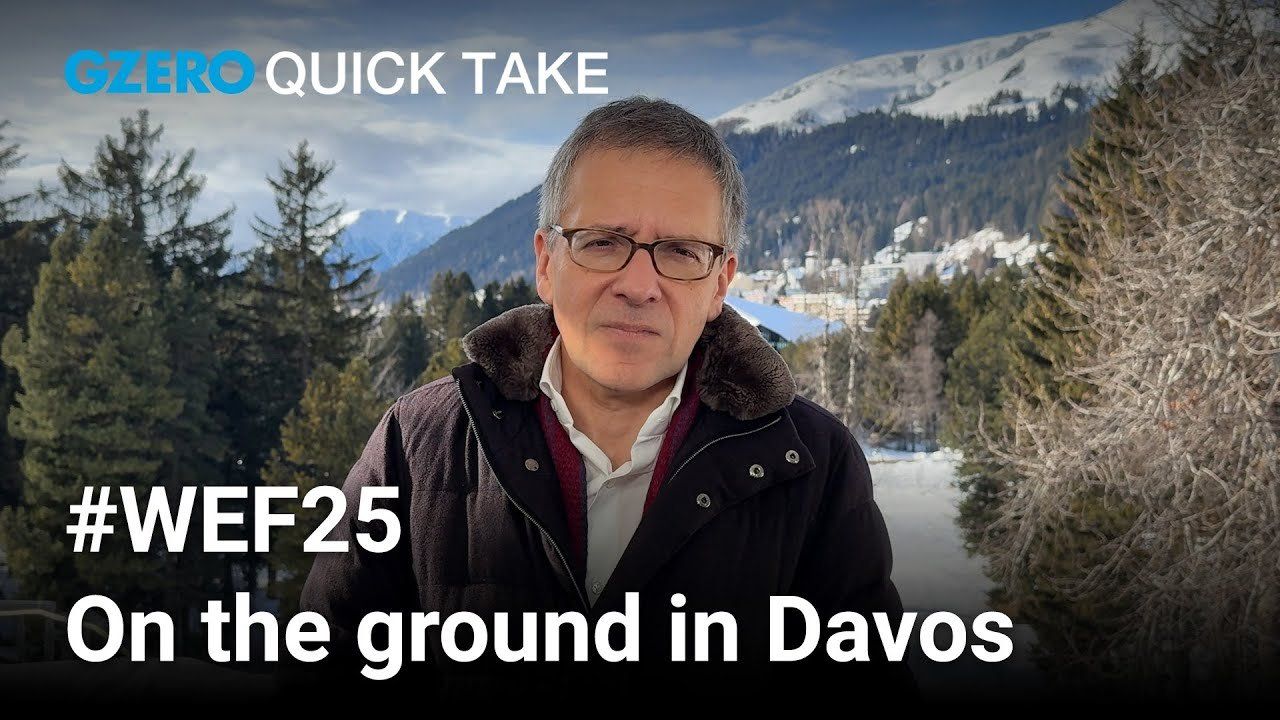January 20, 2025
Ian Bremmer's Quick Take: A Quick Take to kick off your week.
I am standing here at the World Economic Forum's annual meeting in Davos, Switzerland. And of course, it's a split screen right now because everyone's also got their eyes back on Washington, DC and the inauguration for the second time of Donald Trump as president. It is the end of the post-Cold War order. That's what Borge Brende said, he runs the World Economic Forum, in a piece in the New York Times. I call it the G-Zero world, but this is the organization that's most committed to that order over the last 50 years. And of course, committed to doesn't necessarily mean fighting for. I think that's part of the issue, is that so many people, whether they were captains of industry, or media leaders, or heads of state, just believe that, well, after the Soviet Union was defeated, a united, more multilateral, globalized order was just what was coming.
And so, we didn't have to do anything. We just had to keep on keeping on. Of course, that isn't the way it felt for an awful lot of people living inside those countries. And the Americans definitively elected Trump not just once, but twice. And the first time, it was an experiment. He was an outsider to shake things up. The second time, you're electing somebody who's already been impeached twice, who's been convicted for crimes, who's already made very clear that he has no interest in promoting a US-led multilateral order. And that is exactly what people wanted, or at least, more people than wanted the alternative. And so that's where we are.
Outside of the United States, and Davos is mostly about other countries, 60 heads of state are here, and CEOs from all over the world, it’s really a question of how are you responding to that? And I would say that there's a big question of whether or not you accept it and normalize and capitulate, or whether you try to fight. And overwhelmingly, what we have is the former. I mean, the number of times you're talking about things that you never would have found acceptable, a year ago, five years ago, from the United States, cryptocurrencies being launched by the president in the days before his inauguration, making billions, tens of billions of dollars, that's just the way it's done in the United States now. Elon Musk joining phone calls and meetings with CEOs and heads of state. Really bizarre if that was happening with any other leader. But if the United States is doing it, I guess that's just the way it's done. And if the Americans are telling you we're going to take Greenland or we're going to take Canada, we're going to take the Panama Canal, well, we're not going to take that seriously, but we do recognize that we're going to have to give them a little something, because otherwise it's going to cause us a lot of damage.
One major exception here is that I don't expect the Chinese to capitulate at all. I mean, they're talking with the Americans, and maybe there will even be a meeting in the early days, a summit meeting between Donald Trump and XI Jinping. That's very different from a breakthrough deal. And rather, I think we’re at the beginning of what's very likely to be a trade war between the two largest economies in the world. And frankly, of all the things I just mentioned, that's probably the one that is going to concern the attendees of the World Economic Forum the most. Certainly, the one that's going to affect them most.
Anyway, that's where we're starting off with the summit this week. There'll be massive number of meetings over the course of the next few days and I'm sure I'll talk to you again. Talk soon.
More For You
As expected, the Supreme Court struck down the bulk of Donald Trump's sweeping “Liberation Day” tariffs as illegal … and almost nothing changed.
Most Popular
What's Good Wednesdays
What’s Good Wednesdays™, February 25, 2026
Sponsored posts
Small businesses at a crossroads
Chris, an Army veteran, started his Walmart journey over 25 years ago as an hourly associate. Today, he manages a Distribution Center and serves as a mentor, helping others navigate their own paths to success. At Walmart, associates have the opportunity to take advantage of the pathways, perks, and pay that come with the job — with or without a college degree. In fact, more than 75% of Walmart management started as hourly associates. Learn more about how over 130,000 associates were promoted into roles of greater responsibility and higher pay in FY25.
Ukraine's President Volodymyr Zelenskiy, Finland's President Alexander Stubb, Estonia’s Prime Minister, President of the European Commission Ursula von der Leyen and other European leaders visit memorial to fallen Ukrainian defenders at the Independent Square on the fourth anniversary of Russia's full-scale invasion, in Kyiv, Ukraine February 24, 2026.
Ukrainian Presidential Press Service/Handout via REUTERS
Somewhere in the Donbas region, Ukrainian soldier Artem Bondarenko says he hasn’t slept through the night in months as he defends Eastern Ukraine.
- YouTube
In the latest episode of Vladimir Putin and Xi Jinping's hit wellness podcast This Authoritarian Life, we learn how positive communication patterns can break negative cycles in our relationships -- especially our relationships with Iran, Syria, Venezuela, and Cuba. #PUPPETREGIME
© 2025 GZERO Media. All Rights Reserved | A Eurasia Group media company.
